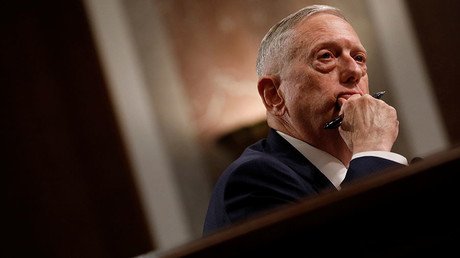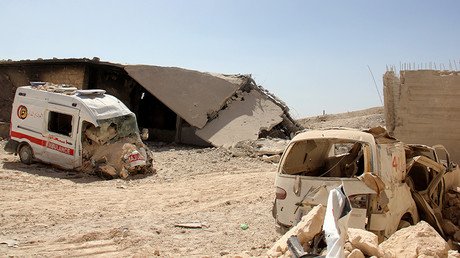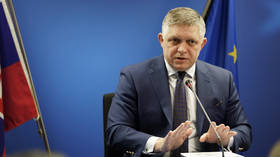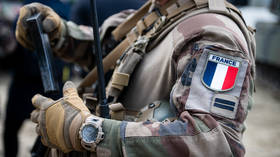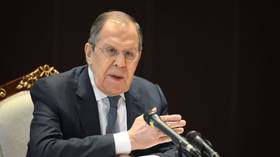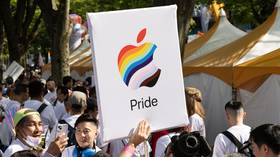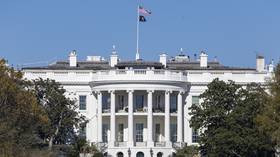Russia vetoes 'unbalanced' US resolution on Syrian chemical weapons, but its draft fails
A Russian resolution on the international inquiry into chemical attacks in Syria has been rejected by the UN Security Council, shortly after Russia vetoed a rival proposal by the US, calling it flawed and unbalanced.
The US and Russia both put forward their respective resolutions to the UN Security Council on how the OPCW-UN Joint Investigative Mechanism (JIM) should proceed with investigating alleged chemical weapons attacks in Syria, including the April incident in Khan Shaykhun. Washington pinned the blame for that attack on the Assad government without waiting for any solid evidence, and JIM inspectors never actually went on the ground to investigate.
#Nebenzia: #Russia could not support the draft resolution penholded by @USUN in course of last weeks we patiently explained that we cannot take seriously the proposed concept. It was wrong from the beginning, being aimed at supporting basic failures in work of #JIM and @OPCW FFM.
— Russian Mission UN (@RussiaUN) November 17, 2017
#Nebenzia: We cannot consider as closed the investigation of the sarin incident in #KhanSheykhun unless the #JIM visits the site and takes samples at the #Shayrat air base. There were related provisions in our draft resolution pic.twitter.com/ZnE9e9lNgn
— Russian Mission UN (@RussiaUN) November 17, 2017
The vetoed US resolution on extending the JIM mandate was supported by 11 members of the Security Council. Apart from Russia, Bolivia opposed the resolution, while China and Egypt abstained.
Russia initially withdrew its rival proposal shortly before the US one was voted on. It later put it back up for consideration at Bolivia's request. The Russian proposal was voted down, gaining the support of only four Council members, while seven rejected it and seven abstained. The US, France, the UK, Sweden, Ukraine, Italy and Uruguay voted against the draft.
Following the vote, Russian UN envoy Vassily Nebenzia said he was disappointed with the outcome, as Russia's proposal was “aimed at the extension and qualitative improvement” of the probe. “We expected that various tricks would be used to make Russia look responsible for a potential end of the JIM probe,” Nebenzia said. He, in turn, placed the blame at the feet of those Council members who rejected the Russian draft.
“There was nothing balanced in the US draft,” Nebenzia said, adding that its only goal was to “question the role of Russia in the process of Syrian political settlement.” In fact, the UK Ambassador to the UN Matthew Rycroft said as much before the vote. “The UK Ambassador said Russia has no place in the political process in Syria. Here it is,” Nebenzia said.
Russia’s decision to veto the resolution provoked an angry reaction from the US envoy to the UN, Nikki Haley. She accused Moscow of “killing” the resolution, which had received backing from most members of the UN Security Council, and of “undermining” the UN’s ability to prevent chemical attacks in the future.
Haley also accused the Russian mission of ignoring their American counterparts' attempts to contact them in the week before the vote. “Our experts got in touch [with the US side] as many times as they were contacted. It is not true,” Nebenzia responded.
Russia has repeatedly criticized the JIM's handling of the investigation of the chemical attacks in Syria. The Russian envoy to the OPCW (Organisation for the Prohibition of Chemical Weapons), Aleksandr Shulgin, said a week ago that the investigation is particularly skewed towards blaming the Assad government one theory behind the chemical attack in Khan Shaykhun. Shulgin said the inquiry fails “basic standards” and ignores any information that would cast doubt on Damascus’s involvement.
“We are of the view that the JIM report, the seventh report, has been established by a flagrant disregard of [the] basic higher standards of the Chemical Convention, UN Security Council resolutions and previous decisions by the ECE executive council,” Shulgin said.
Later in November, the Russian Foreign Ministry accused the probe of disregarding the Chemical Convention’s guidelines and of “dilettantism.” In response, the head of the JIM, Edmond Mulet, accused Moscow of trying to protect the Syrian government. The ministry firmly rejected Mulet’s allegations, saying he was only trying to whitewash his own reputation, shaken by the improper investigation.
Russia has repeatedly questioned the findings of the probe, pointing that the incident might have been the result of an explosion at a warehouse containing chemical agents or a false flag operation by rebels. Moscow is criticizing the OPCW investigators for failing to examine the site of the attack and instead relying on questionable testimonies from unidentified persons. The US-led coalition, pinning the blame on the Syrian government immediately after the attack, launched an airstrike at the Syrian Shayrat airbase, from which it claimed the chemical attack had originated.
